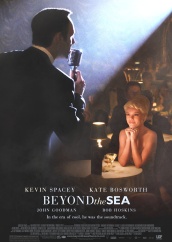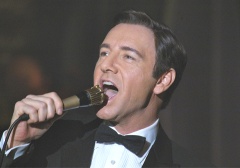|
Beyond the Sea |
| |
 |
USA/Germany/UK, 2004. Rated PG-13. 114 minutes.
Cast: Kevin Spacey, Kate Bosworth, Bob Hoskins, John Goodman, Caroline Aaron, Brenda Blethyn, William Ullrich, Greta Schacchi, Peter Cincotti, Michael Byrne, Matt Rippy, Gary Whelan
Writer: Lewis Colick
Music: Christipher Slaski (incidental score)
Cinematography: Eduardo Serra
Producers: Jan Fantl, Arthur E. Friedman, Kevin Spacey
Director: Kevin Spacey
LINKS
|
 hat has happened to Kevin Spacey? Once known for edgy material like The Usual Suspects, Swimming with Sharks, and LA Confidential, the two-time Oscar winner has gone wildly astray since American Beauty. Consider his four major films since playing Lester Burnham: Pay It Forward, K-PAX, The Shipping News, The Life of David Gale—each performance more sanctimonious, self-satisfied, and (let's face it) boring than the last.
hat has happened to Kevin Spacey? Once known for edgy material like The Usual Suspects, Swimming with Sharks, and LA Confidential, the two-time Oscar winner has gone wildly astray since American Beauty. Consider his four major films since playing Lester Burnham: Pay It Forward, K-PAX, The Shipping News, The Life of David Gale—each performance more sanctimonious, self-satisfied, and (let's face it) boring than the last.
Now Spacey takes a huge risk with Beyond the Sea, a biopic about crooner Bobby Darin, who enjoyed a brief reign as a major pop star in the late Fifties and early Sixties. Spacey stars. He directs. He sings. He dances. Has Spacey moved away from cheap sentimentality and back to more audacious material? No. Spacey's smirking, preening interpretation of Darin in a vanilla film that plays like an extended production number is every bit as smug as his last several performances. By all accounts, Darin was not a modest man, but that doesn't make Spacey's mugging for the camera any more tolerable.
Why do we need a Darin biopic anyway? Though an extremely talented singer, Darin is hardly an essential figure in modern music. Darin's cover of “Mack the Knife” from Threepenny Opera spent nine weeks at Number One on the Billboard Pop Singles chart in 1959. He charted a total of thirty-six singles between 1958 and 1967, and one more in 1969. He won two Grammies and was even nominated for an Oscar. He married Hollywood starlet Sandra Dee. Darin did not change the course of music history, though, nor is he an enduring icon. He could be described (perhaps unfairly) as Frank Sinatra Lite.
Maybe there was something particularly unusual about Darin's story. Let's see: he came from a low-income Italian American family, but so did other great singers. He rose to prominence thanks to a silly rock song he wrote himself called “Splish-Splash,” but immediately turned his back on teen idolatry to record classic pop standards. Later on he experimented with folk music and spent the last couple years of his life recording for Motown. That's a bit odd, but is it enough for a movie? There's something else: Darin was born with a rheumatic heart, and though he died young, he still survived twenty years longer than expected. Okay, so we have a star who came from nothing, lived on borrowed time, and made unusual career choices.

Kevin Spacey sings showtunes and standards in Beyond the Sea. |
Does Spacey explore these choices, though? Not really. Mostly he just chronicles the principal events of Darin's life, with a story arc that resembles your average VH1 Behind the Music special. The screenplay glosses over the most interesting bits. How could such a sick, economically disadvantaged boy become an overnight sensation? In the movie, it just seems to happen. What about his relationship with Sandra Dee? In the movie, it just seems to happen, and the screenplay doesn't even tell you that they divorced in 1967. Most importantly, why was everyone around Darin so devoted to him? He doesn't seem like a pleasant guy.
We don't learn the answers to these questions. What we learn is, “Hey, Spacey can sing!”
Yes, Spacey is a heck of a singer, and proves it time and again as he runs though Darin's greatest hits. His co-star Kate Bosworth looks surprisingly like Sandra Dee (no Blue Crush surfer chick in evidence), and tries to suggest with her performance that Dee was little more than a child taken in by Darin's games. The film also has a decent sense of humor—the recurring toupee joke, a funny Rock Hudson reference. Finally, the idea that Darin can get away with singing protest songs as long as he's wearing a tux because “people hear what they see” is an interesting observation on human psychology.
Less interesting is the irritating post-modern narrative device framing the story. Spacey opens with Darin heading through the Copacabana club with his entourage (a la Goodfellas) and emerging on stage. He launches into his big number. Then a kid (ineptly played by William Ullrich) appears. Darin spots him, and interrupts his act. Look, it's not really a stage—it's a movie set! “That's the kid playing him as a kid!” shouts Darin's brother-in-law Charlie (Bob Hoskins, struggling as usual with his American accent). See, Darin is making a movie about himself, and he's searching for the truth. “You want some truth? I'll give you some truth!” exclaims the kid, and takes Darin to the street where he grew up. What is this, A Christmas Carol? To make matters worse, it's the same type of framework used more effectively in this year's other major musician biopic, De-Lovely.
Why the film-within-a-film artifice? It does allow screenwriter Lewis Colick to reinforce his weak screenplay with explicative narrative, but that's not it. The real reason becomes screamingly obvious when a reporter demands (referring to Darin), “Isn't the real truth he's too old to play this part!?” Charlie responds with, “That's just crap! How can you be too old to play yourself!” There you have it: an overt, conspicuously self-conscious attempt to head off criticism that Spacey shouldn't play a guy who became a star at twenty-two and was dead by thirty-seven. We're supposed to accept Spacey because we're watching the older Darin playing himself. Riiiight. No amount of post-modern contortion can get around the fact that the forty-five year old Spacey has paired himself onscreen with twenty-one year old Bosworth. There was less of an age difference between Spacey and his American Beauty co-star Mena Suvari.
In American Splendor, the postmodern behind-the-scenes narrative device (which takes you inside the film's production as you watch it) successfully reflected something essential about its cynical, disgruntled protagonist. But Darin isn't disgruntled or cynical. He's old school. He abandons rock in favor of standards because he wants to prove he can sing. The ungainly structure is inappropriate to the character.
No story yearns to be told in Beyond the Sea, so we can only assume that Spacey (born in 1959) made this his pet project because he is a big fan. It's kind of odd to think of a child of the Sixties raptly listening to Darin singing adult-oriented pop and not the Beatles, but I guess some kids will do that. Regardless, the film fails to pay tribute to the most important thing—Darin's voice. Because Spacey sings everything (ostensibly for a more natural effect on screen), Darin's artistry is filtered through Spacey's interpretation, and thus lost. The film winds up being more a celebration of Spacey than Darin. Now we hear that Spacey plans to take a big band on tour to promote the film. Is he promoting the film, or is he promoting himself?
Review
© December 2004 by AboutFilm.Com and the author.
Images © 2004 Lions Gate Films. All Rights Reserved.


